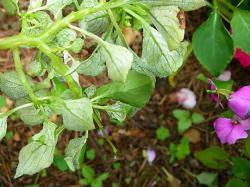Impatiens Downy Mildew Observed In U.S. Landscapes
October 20, 2011 | 2 min to read

WEST CHICAGO, IL – Impatiens downy mildew was observed in U.S. landscapes late this season, prompting Ball Horticultural Company to provide educational resources and landscape recommendations to landscape contractors, to help slow the spread of this disease in North America. The company is advising landscape contractors to closely inspect beds of Impatiens walleriana, promptly remove infected plants, and to plant alternative flowers and foliage next season in beds with a history of this disease.
Impatiens walleriana can become infected by short-lived aerial spores that are easily dispersed by wind currents and splashing water, or by oospores that may survive the winter in the soil.
“Scouting impatiens beds for this disease, and promptly removing infected plants and leaf debris, can help reduce overwintering spores in the soil that may initiate new infections next season,” says Dr. Colleen Warfield, plant pathologist for Ball Horticultural Company.
The downy mildew infecting impatiens is specific to Impatiens walleriana (garden impatiens) and will not infect other plants. All seed and vegetative varieties of Impatiens walleriana are susceptible to downy mildew. However, New Guinea impatiens are highly tolerant of this disease. Cool temperatures, especially at night, are ideal for rapid disease development. Moist air, rainy weather or irrigation practices that extend the amount of time moisture remains on the leaves also encourage the development and expression of downy mildew.
Symptoms
Downy mildew symptoms on Impatiens walleriana typically start with a few leaves that appear slightly chlorotic or stippled, and become completely yellow over time. Some varieties will have subtle gray markings on the upper leaf surface. A white, downy-like growth may be present on the underside of primarily yellow leaves, but can also be found on the underside of green leaves. As the disease progresses, premature leaf drop results in bare, leafless stems. Eventually these stems can become soft and the plant collapses, similar to frost damage.
Experts at Ball will soon provide disease management recommendations to greenhouse growers. Watch for additional disease management and cultural suggestions at ballhort.com.
To review Ball’s current impatiens downy mildew educational resources, alternative crop recommendations, and answers to landscapers’ Frequently Asked Questions, visit BallLandscape.com.
Ball Horticultural Company is an internationally renowned breeder, producer and wholesale distributor of ornamental plants. A family-owned business since it was founded in 1905, Ball has introduced many innovative, award-winning varieties to the world of horticulture, including the Wave® petunia family and Super Elfin® impatiens. Ball is committed to sustainable practices and has highlighted its green accomplishments in its “Sustainability Report.” The company has worldwide production, sales and marketing through its many subsidiaries on six continents. For further information, log on to ballhort.com.
Source: Ball Horticultural Company
